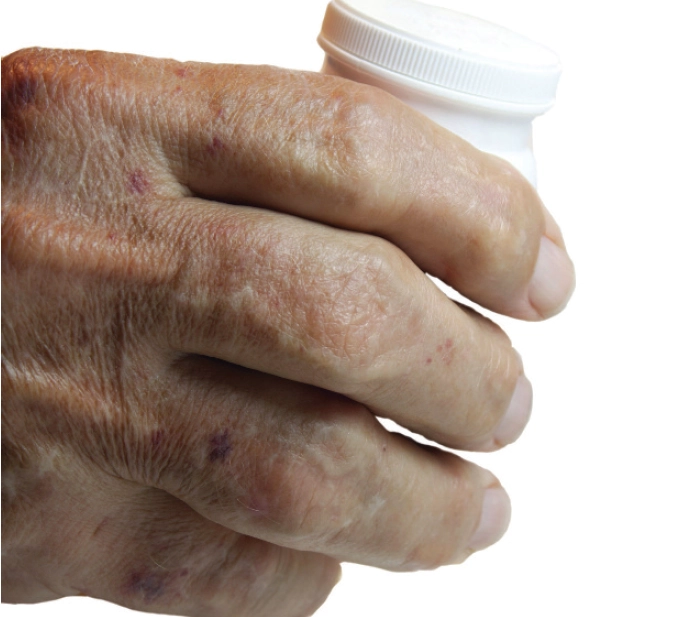
808isgreat/Dreamstime.com
This content was published in 2010. We do not recommend that you take any clinical decisions based on this information without first ensuring you have checked the latest guidance.
A patient taking low-dose methotrexate for rheumatoid arthritis was admitted to a surgical short stay unit for a minor procedure. On discharge, the nursing staff were concerned that he had been prescribed paracetamol 1g four times daily and ibuprofen 400mg three times daily, so contacted the pharmacy for advice.
Concerns
There have been a number of cases of methotrexate toxicity — some fatal — reported in patients taking non-steroidal antiinflammatory drugs, such as ibuprofen, with methotrexate. It is thought that NSAID-induced inhibition of prostaglandin synthesis leads to reduced renal perfusion, which reduces the renal excretion of methotrexate. As a result, methotrexate could accumulate. However, some studies have found that NSAIDs do not change the pharmacokinetics of methotrexate.
The risk of an interaction seems greatest with high-dose methotrexate (eg, 150mg or more daily to treat neoplastic disease) and in patients with impaired renal function. There appears to be a much lower risk in patients with normal renal function and who are given low doses of methotrexate (eg, 5–25mg weekly) for conditions such as Crohn’s disease, psoriasis or rheumatoid arthritis.
Advice
The advice of the Committee on Safety of Medicines (CSM; incorporated into the Commission on Human Medicines in 2005) is that any patient prescribed low-dose methotrexate alone should have a full blood count and renal and liver function tests before starting treatment. These tests should be repeated weekly until therapy is stabilised, and every two to three months thereafter. The manufacturers of methotrexate and the CSM have not specifically advised the avoidance of prescribed NSAIDs. Their advice regarding prescribed ibuprofen and other NSAIDs is that the methotrexate should be well monitored, which implies that the monitoring should be more frequent. It should be noted, however, that both the CSM guidance and the manufacturers advise against the use of azapropazone or non-prescription ibuprofen with low-dose methotrexate therapy.
The nurse was advised to explain to the patient that ibuprofen may affect his methotrexate therapy, but that the risks in his case were small. The importance of reporting any sign or symptom suggestive of increased serious methotrexate adverse effects was reinforced; namely to report any symptoms suggestive of infection or blood dyscrasias (eg, sore throat, bruising or mouth ulcers), symptoms of liver impairment (eg, nausea, vomiting or dark urine), and any dyspnoea or cough, which can suggest pulmonary toxicity. The patient was also advised that paracetamol does not affect methotrexate, and warned not to take any additional non-prescription ibuprofen (or paracetamol — the prescribed dose is the maximum recommended daily dose).
Food
Having been advised that he should take his ibuprofen with food to reduce the risk of gastrointestinal irritation, the patient asked whether there were any particular cautions with regards to methotrexate and food intake. The absorption of methotrexate does not appear to be significantly affected by food — studies have been carried out with meals containing milk, orange juice or a high fat content. The patient was therefore advised that he could take methotrexate with or without food. Note that a potential interaction between caffeine and low-dose methotrexate has been suggested, with two reports of no interaction and two reports suggesting that methotrexate efficacy may be reduced by a high caffeine intake (more than 180mg daily). At present there is insufficient evidence to make any general recommendations regarding caffeine intake in patients taking methotrexate. It may, however, be worth considering this as a possible factor if this patient’s response to methotrexate is less than expected.
Details
This theoretical case was produced by Alison Marshall, Jennifer Sharp and Karen Baxter on behalf of the Stockley editorial team. The 9th edition of “Stockley’s drug interactions” (May 2010), is now available in print, CD-ROM and at www.medicines complete.com from the Pharmaceutical Press.


